英语ⅰ译林牛津版unit1schoollife教案grammaran
牛津译林版高中英语必修一《Unit 1 School life》grammar 导学案
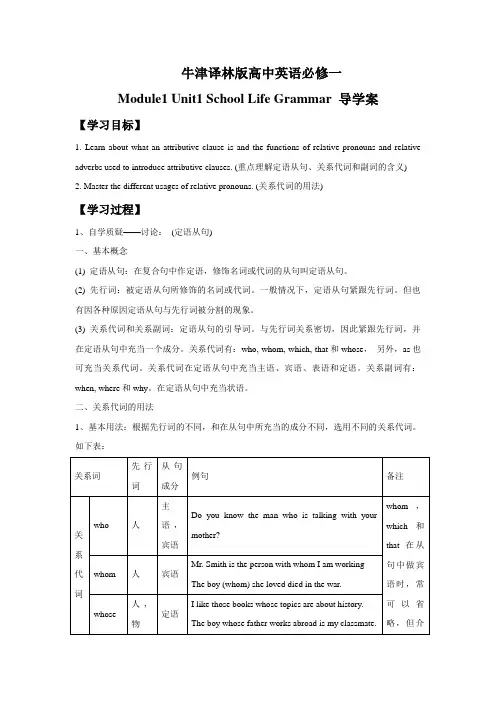
牛津译林版高中英语必修一Module1 Unit1 School Life Grammar 导学案【学习目标】1. Learn about what an attributive clause is and the functions of relative pronouns and relative adverbs used to introduce attributive clauses. (重点理解定语从句、关系代词和副词的含义)2. Master the different usages of relative pronouns. (关系代词的用法)【学习过程】1、自学质疑——讨论:(定语从句)一、基本概念(1) 定语从句:在复合句中作定语,修饰名词或代词的从句叫定语从句。
(2) 先行词:被定语从句所修饰的名词或代词。
一般情况下,定语从句紧跟先行词。
但也有因各种原因定语从句与先行词被分割的现象。
(3) 关系代词和关系副词:定语从句的引导词。
与先行词关系密切,因此紧跟先行词,并在定语从句中充当一个成分。
关系代词有:who, whom, which, that和whose,另外,as也可充当关系代词。
关系代词在定语从句中充当主语、宾语、表语和定语。
关系副词有:when, where和why。
在定语从句中充当状语。
二、关系代词的用法1、基本用法:根据先行词的不同,和在从句中所充当的成分不同,选用不同的关系代词。
如下表:例如:(注意关系代词在定语从句中所充当的成分)①Do you know the professor who/that will give us a speech next week?(作主语)②I read a report about his new novel that/ which will soon be published. (作主语)③The plan that/which they argued about was settled at last. (作宾语)④This is the new secretary (who/whom/that) I would like to introduce to you. (作宾语)⑤The soldier whose legs were badly wounded was operated on without delay. (作定语) 注意:关系代词在定语从句中充当宾语时可以省略,充当主语时则不能。
unit1schoollife教学设计及grammar1教案(译林牛津版必修1).docx
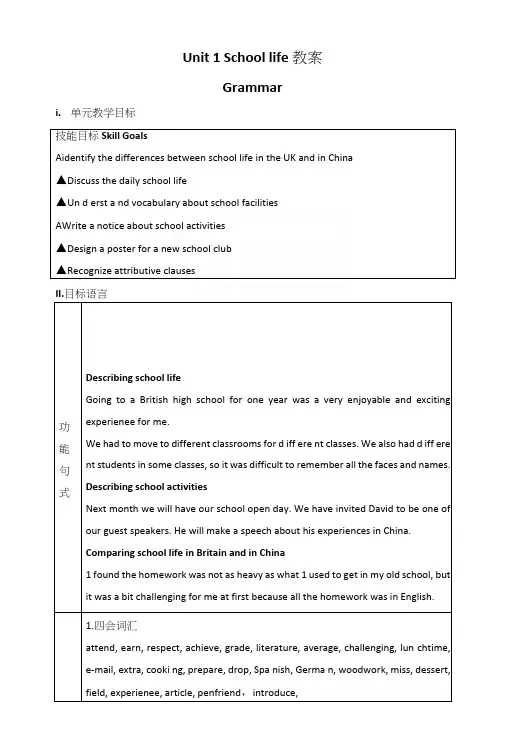
Unit 1 School life 教案Grammari.单元教学目标技能目标Skill GoalsAidentify the differences between school life in the UK and in China ▲Discuss the daily school life▲Un d erst a nd vocabulary about school facilitiesAWrite a notice about school activities▲Design a poster for a new school club▲Recognize attributive clauses功能句式Describing school lifeGoing to a British high school for one year was a very enjoyable and exciting experienee for me.We had to move to different classrooms for d iff ere nt classes. We also had d iff ere nt students in some classes, so it was difficult to remember all the faces and names. Describing school activitiesNext month we will have our school open day. We have invited David to be one of our guest speakers. He will make a speech about his experiences in China. Comparing school life in Britain and in China1 found the homework was not as heavy as what 1 used to get in my old school, but it was a bit challenging for me at first because all the homework was in English. 1.四会词汇attend, earn, respect, achieve, grade, literature, average, challenging, lun chtime, e-mail, extra, cooki ng, prepare, drop, Spa nish, Germa n, woodwork, miss, dessert, field, experienee, article, penfriend,introduce,词汇immediately, former, rece ntly, culture, develop, photograph, don ate, gift, display, kindness, guest, speech, flat, bookcase, attention, please, title, dyn a sty, cover, rece nt, professor, regret, in form, run, host, approve, broadcast, preparation, close, outing, continue, poet, generation, poem, select, require, scary, nature2.认读词汇assembly3.短语for free, pay attention to语法Introduction to attributive clausesRelative pronouns: that, which, who, whom, and whose重点句子1.1 sat next to a girl whose name was Diane・ P22.David was one of the most helpful studentsthat we ever had. P93.In 1998, he went to Oxford University where he got interested in Chinese culture. P94.Some of the cities in China which he likes most are Beijing, Shanghai, Harbin and Nanjing. P95.Most of the students that he taught have become his friends. P96.Some of the books were gifts that he got from his Chinese friends and students. P97.The paintings that David donated to the school are being displayed in the assembly hall. P98.During exam time we have a special programme that tells students the things they should or shouldn't do for preparation. P18m.教材分析与教材重组i.教材分析本单元以School life为话题,旨在通过单元教学使学生了解英国校园生活的一些基木情况及中英两国校园牛活的不同之处;学习并能运用表示校园设施的一些基本词汇;学习定语从句的基本概念及关系代词的用法;能就校园活动的话题展开讨论;能就校园活动情况向班任老师做出报告;学习通知的写法;学会设计以介绍学校俱乐部为主题的海报等。
牛津译林版高中英语必修一《Unit 1 School life》 Grammar 教学设计
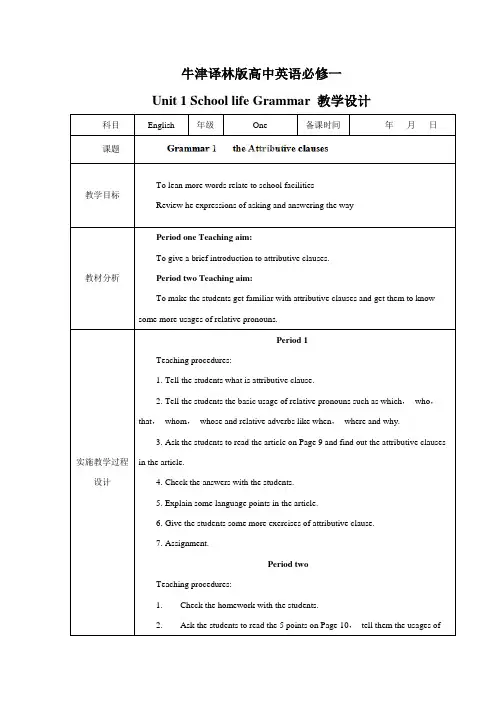
牛津译林版高中英语必修一Unit 1 School life Grammar 教学设计科目English 年级One 备课时间年月日课题教学目标To lean more words relate to school facilitiesReview he expressions of asking and answering the way教材分析Period one Teaching aim:To give a brief introduction to attributive clauses.Period two Teaching aim:To make the students get familiar with attributive clauses and get them to know some more usages of relative pronouns.实施教学过程设计Period 1Teaching procedures:1. Tell the students what is attributive clause.2. Tell the students the basic usage of relative pronouns such as which,who,that,whom,whose and relative adverbs like when,where and why.3. Ask the students to read the article on Page 9 and find out the attributive clauses in the article.4. Check the answers with the students.5. Explain some language points in the article.6. Give the students some more exercises of attributive clause.7. Assignment.Period twoTeaching procedures:1. Check the homework with the students.2. Ask the students to read the 5 points on Page 10,tell them the usages of。
模块1unit1schoollife(语法)(译林牛津版高一英语必修一教案教学设计)

模块1 unit 1 school life (语法)(译林牛津版高一英语必修一教案教学设计)总课题:U1 课时:主备人:lilyyao课型:Grammar 授课时间:教学目标: Introduce attributive clause教学重点:The basic usage of the relative pronouns and learn to use them in different situations.教学难点:How to help the students to learn the Attributive Clause efficiently.教学过程:Step 1.Revision:Check homework.Step 2. PresentationLook at the picture at page8 and ask the students to speak out what they may think of.(Write down these three structures on the Bb or show them on the screen below the picture.) Adjective: a green teamPrepositional phrase: a team in greenAttributive clause: a team who were wearing greenAttributive clause modifies a noun in the same way as adjective or prepositional phrase does. The noun it modifies is called an antecedent.Read Part2 at page8. Attributive clauses are usually introduced by relative pronouns like which, that, who, whom, and whose, or relative adverbs like where, why and when. In the clause these relative words usually function as the following: (page8)Step3Read the article at page9 and underline the attributiveclauses you find in the article.Relative pronouns: that, which, who, whom and whose. Read this part at page10 and grasp the usages of these relative pronouns.(show the screen) Then do the exercise at page11.Step 4.Introudction1. 语法术语及基本概念:(1). 先行词: 被定语从句所修饰的那个词。
英语:unit1《school life》教案(译林牛津版必修1)
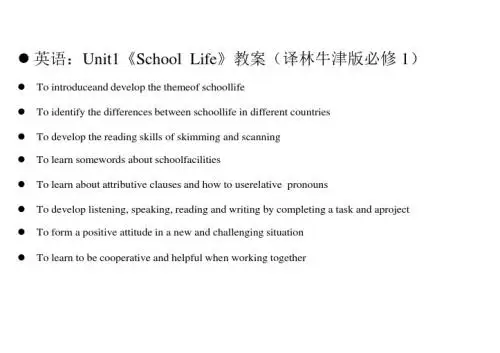
2. 3. 4. 5. 6. 7.
Skimming Scanning Detailed reading Thoughts after reading Group work (problem solving) Introducing moreinformation
英语:Unit1《School Life》教案(译林牛津版必修 1)
To introduceand develop the themeof schoollife To identify the differences between schoollife in different countries To develop the reading skills of skimming and scanning To learn somewords about schoolfacilities To learn about attributive clauses and how to userelative pronouns To develop listening, speaking, reading and writing by completing a task and aproject To form a positive attitude in a new and challenging situation To learn to be cooperative and helpful when working together
To know about schoollife in the UK
To compareschoollife in the UK and in China To form a positive attitude in a new and challenging situation
译林牛津版高一英语必修一unit1schoollife教案
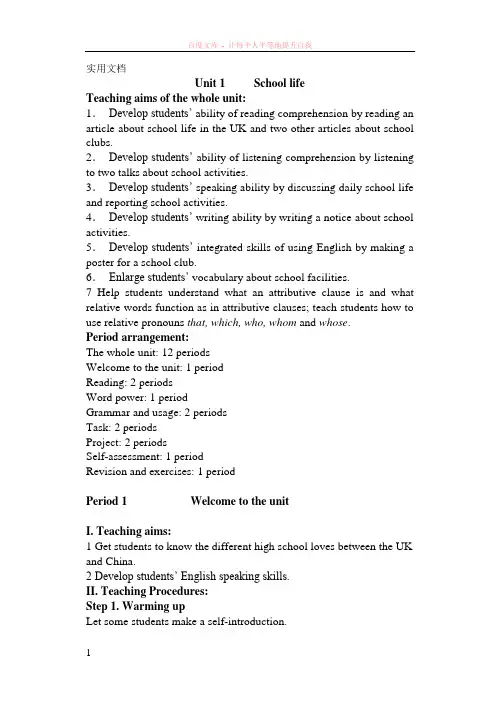
Unit 1 School lifeTeaching aims of the whole unit:1.Develop students’ ability of reading comprehension by reading an article about school life in the UK and two other articles about school clubs.2.Develop students’ ability of listening comprehension by listening to two talks about school activities.3.Develop students’ speaking ability by discussing daily school life and reporting school activities.4.Develop students’ writing ability by writing a notice about school activities.5.Develop students’ integrated skills of using English by making a poster for a school club.6.Enlarge students’ vocabulary about school facilities.7 Help students understand what an attributive clause is and what relative words function as in attributive clauses; teach students how to use relative pronouns that, which, who, whom and whose.Period arrangement:The whole unit: 12 periodsWelcome to the unit: 1 periodReading: 2 periodsWord power: 1 periodGrammar and usage: 2 periodsTask: 2 periodsProject: 2 periodsSelf-assessment: 1 periodRevision and exercises: 1 periodPeriod 1 Welcome to the unitI. Teaching aims:1 Get students to know the different high school loves between the UK and China.2 Develop students’ English speaking skills.II. Teaching Procedures:Step 1. Warming upLet some students make a self-introduction.1. Introduce themselves.2. Say something about their junior high school life.3. Pair work: brain storm:When we are talking about our school life, what will we probably think of?What words or phrases will we use to describe our school life? Step 2 Presentation1.Say the following to students:It’s the beginni ng of the new term. You’ve just finished your junior high and are about to enter a new period in your studies. I am happy to give your lessons and I hope we can be friends.I can see that some of your are eager to know what studying at senior high will be like. Will it be differ4ent from junior high? Well, there are certainly many differences between junior high and senior high, but there are also some things that are the same in every school in China. What about schools in other countries? Do you have different experiences? Are schools all over the world the same? This is the subject of our first unit.2. Ask students to read the instruction and tell them:Here are three pictures that show some aspects of school life in the UK. Please read the instructions, look at the pictures: what's the difference between schools in China and the UK?Step 3 Discussion1 Ask students the following questions to talk about the words in the four pictures:Huge campus and low-rise buildingsWhat does huge mean?What does low-rise mean?What about campus and school buildings in China?(Schools in China usually have a large enough campus to make sure students have enough space to study and play. But most school buildings have at least 3 storeys.)Lockers for every studentDo you know what a locker is?(There are rows of lockers by the classrooms for students to put their bookd, exercise-books and other belongings.)What do you think about locker for students?Do you think that we should have such locker in our school? Why or Why not?Fewer students in each classHow many students are there in our class?Do you know the number of students in a class in the UK?At ease with our teacherWhat can we know from this picture?What does the word ease mean? What do you think the phrase at ease mean?Were you getting on well with the teacher when you were in junior high?What relationship do you want to have with your teachers in senior high?2 Ask students to work in groups to talk about the four pictures and the differences between schools in the UK and China. Then ask several students to report their discussion to the whole class.aspects In the UK In ChinaHuge campus and low-rise buildings We can see hugecampus andlow-rise buildings.It is the biggestdifference fromschools in ChinaSchools in China usually have alarge enough campus to make surestudents have enough space tostudy and play in.But most school buildings aretaller, at least three storeys.Lockers for every student There are rows oflockers by theclassrooms forstudents to put theirstationary, books,exercise-books andother belongings.Students bring what they need forlessons to school and then take itall back home after school. Mostschools in china do not haveequipment in the classroom.Fewer students in each class There are fewerstudents in a class,no more than 30 perThere are usually more students inhigh school, perhaps 40 to 50 perclass. Recently some schools areclass. beginning to limit the number ofstudents in each class.At ease with our teacher Students have aclose relationshipwith their teachers.They feel at easeand comfortablewith them.It is similar in china. Nowadays,lots of teachers and students haveestablished a good relationshipwith each other. They respect eachother and work to gain a betterunderstanding of each other.3. Ask students to discuss the three questions in pairs, and them ask some of them to report their answers to the questions to the whole class.What is your dream school life like?What kind of school activities do you enjoy?What do you think of your life here in the new school?Step 4 Summary and HomeworkToday we’ve mainly talked about the differences between the high school lives in the UK and in China. After class you should:1) Recall all the new words and expressions that we learn in this lesson.2) Find more about any other differences between the high school lives in the UK and in China, either by surf the Internet or by reading some articles in newspapers or magazines.3) Preview the following part: reading (page 2 to page 4).Period 2 Reading (1) School life in the UKTeaching aims:1. Get students to know what school life is like in a high school in the UK.2. Develop students’ ability of reading comprehension through:1)skimming and scanning.2)Guessing the meanings of some new words from the context3. To learn some expressions about school life.Teaching procedures:Step 1 Lead-in and PresentationSay the following to the students:Yesterday we’ve talked about the differences between the high school lives in the UK and in China. We know well about the high school lives in China, because we are Chinese. But we know a little about the high school lives in the UK. Yeah? Today we are going to read a magazine article which is written by an exchanging student. She has been studying in the UK for one year. Now she gives a clear brief introduction about her school life there.(Bb: School life in the UK) Before we read the article, we are going to learn the reading strategy: skimming and scanning.Please look at page 3: Reading strategy. (Bb the following while learning the reading strategy. )Skimming: to get a general idea of the article, without studying it in detail.Focus on the titles, headings, the first and last sentences or paragraphs, charts and pictures …scanning: to find certain information in an article quickly.Look for key words and phrases, dates and numbers, etc.Step 2. Reading1. Skimming:Question: How does Wei Hua feel about her life in the UK?2. Scanning:1)Ask students to go through the three questions in part A and makesure that each of them know the meaning of each question.(AWoodwork class is a class in which students make somethingfrom wood.)Ask students to read the passage as quickly as possible and try to find answers to the three questions. Remind students only tofocus on and identify the most important information.2)Ask student to reread the passage and complete Part C1individually. Then ask some of them to give the answers to thequestions in Part C13)Ask students to finish Part C2 individually. Then get somestudents to share their answers with the whole class. Ask them to say the true sentences to correct the false ones.3 GuessingAsk students to finish Part D individually. Tell them not to look up the meanings of the words from the wordlists in the textbook. Let themguess the meanings from the context. Then check the answers with the whole class.Step 3 New Words in this UnitStudy the new words appears from page2 to page 5 (from attend to immediately) at page 68.Step 4. Homework.1. Complete part E on page 5.2. Read the two articles in reading on pages 82 and 83 in wb and answers the questions below them.3. Learn all the new words we learned today by heart.Period 3 Reading (2) School life in the UKTeaching aims:1 Help students become more familiar with the article.2 Develop students’ ability of reading comprehension by finding out what topics are covered in the article.3 Develop students’ ability of speaking by discussing the subjects they like in school.Teaching Procedures:Step 1. Revision:Check the homework:1)Have a dictation to go over the words learned last period.2)Check the answers in reading on pages 82 and 83 in wb.3)Ask some students to read the article in Part E to check whetherthey have used the suitable word in each blank.Step 2 Reading1) Ask some students to read the article aloud paragraph by paragraph. Ask other students to find out what topics are covered in it.School hoursSchool assemblyTeachersClass sizeDifferent classes in different classroomsHomeworkSubjects and favourite subjectsWhat to do at lunchtimeBritish food3)Ask students to point out the different high school lives in the UKand in China in these topics.Step 3 DiscussionLet students look at Part F together and discuss the questions in Part F in Pairs. Then get some pairs to act out their discussion in class.Step 4 Language focus1 Ask students to find out the following words, phrases and sentences in the article. Then give some explanations.Words:a)as (since, because, for)b)attend (join, join in, take part in)c)prepared)experiencee)respectf)exciting, excitedg)dropPhrases:a)for freeb)be happy withc)used to do sth.; be/get used to do sth.; be/get used to doing sth.d)the way to do; the way of doing; the way + Attributive Clausee)at the end of; in the end; by the end off)as … asSentences:a)Going to a British school for one year has been a very enjoyableand exciting experience for me.b)I do like eating.c)We also had different students in some class, so it was difficult toremember all the faces and names.2 Ask students to put the following sentences into English in their exercise-books.1) Jim 加入了我们的讨论之列。
高一牛津英语模块一Unit1Schoollife教案共十二课时译林牛津版必修1
Unit 1 School lifeTeaching aims of the whole unit:1.Develop students ' ability of reading comprehension by reading an article about school life in the UK and two other articles about school clubs.2.Develop students ' ability of listening comprehension by listening totwo talks about school activities.3.Develop students ' speaking ability by discussing daily school life and reporting school activities.4 .Develop students ' writing ability by writing a notice about school activities. 5.Develop students ' integrated skills of using English by making a poster for a school club.6.Enlarge students ' vocabulary about school facilities.7 Help students understand what an attributive clause is and what relativewords function as in attributive clauses; teach students how to use relative pronouns that, which, who, whom and whose.Period arrangement:The whole unit: 12 periodsWelcome to the unit: 1 periodReading: 2 periodsWord power: 1 periodGrammar and usage: 2 periodsTask: 2 periodsProject: 2 periodsSelf-assessment: 1 periodRevision and exercises: 1 periodPeriod 1 Welcome to the unitI. Teaching aims:1 Get students to know the different high school loves between the UK andChina.2 Develop students ' English speaking skills.II. Teaching Procedures:Step 1. Warming upLet some students make a self-introduction.1. Introduce themselves.2. Say something about their junior high school life.3. Pair work: brain storm:When weare talking about our school life, what will weprobably think of?What words or phrases will we use to describe our school life?Step 2 Presentation1. Say the following to students:It 's the beginni ng of the new term. You 've just finished your junior high and are about to enter a new period in your studies. I am happy to give your lessons and I hope we can be friends.I can see that some of your are eager to know what studying at senior highwill be like. Will it be differ4ent from junior high? Well, there are certainly many differences between junior high and senior high, but there are also some things that are the same in every school in China.What about schools in other countries? Do you have different experiences?Are schools all over the world the same? This is the subject of our first unit.2. Ask students to read the instruction and tell them:Here are three pictures that show someaspects of school life in the UK. Please read the instructions, look at the pictures: what's the difference between schools in China and the UK?Step 3 Discussion1 Ask students the following questions to talk about the words in the four pictures: Huge campus and low-rise buildingsWhat does huge mean?What does low-rise mean?What about campus and school buildings in China?(Schools in China usually have a large enough campus to make sure students have enough space to study and play. But most school buildings have at least 3 storeys.) Lockers for every student Do you know what a locker is?(There are rows of lockers by the classrooms for students to put their bookd, exercise-books and other belongings.)What do you think about locker for students?Do you think that we should have such locker in our school? Why or Why not?Fewer students in each classHow many students are there in our class?Do you know the number of students in a class in the UK?At ease with our teacherWhat can we know from this picture?What does the word ease mean? What do you thi nk the phrase at ease mean?Were you gett ing on well with the teacher whe n you were in junior high?What relati on ship do you want to have with your teachers in senior high?2 Ask stude nts to work in groups to talk about the four pictures and the differe nces betwee n schools in the UK and Chi na. The n ask several stude nts to report their discussi on to the whole class.3. Ask stude nts to discuss the three questio ns in pairs, and them ask some of them to report their an swers to the questi ons to the whole class.What is your dream school life like?What kind of school activities do you enjoy?What do you think of your life here in the new school?Step 4 Summary and HomeworkToday we' ve mainly ta lked about the differe nces betwee n the high school lives in the UK and in China. After class you should:1) Recall all the new words and expressi ons that we learn in this less on.2) Find more about any other differences between the high school lives in the UKand in China, either by surf the Internet or by reading somearticles in n ewspapers or magaz in es.3) Preview the follow ing part: read ing (page 2 to page 4).Period 2 Readi ng (1) School life in the UKTeach ing aims:1. Get students to know what school life is like in a high school in the UK.2. D evelop students ' ability of reading comprehension through : 1) skimming and scanning.2) Guessing the meanings of some new words from the context3. To learn some expressions about school life.Teaching procedures:Step 1 Lead-in and PresentationSay the following to the students:Yesterday we've talked about the differences between the high school lives in the UK and in China. We know well about the high school lives in China, because we are Chinese. But we know a little about the high school lives in the UK. Yeah? Today we are going to read a magazine article which is written by an exchanging student. She has been studying in the UK for one year. Now she gives a clear brief introduction about her school life there.(Bb: School life in the UK)Before we read the article, we are going to learn the reading strategy: skimming and scanning. Please look at page 3: Reading strategy.(Bb the following while learning the reading strategy. )Skimming: to get a general idea of the article, without studying it in detail. Focus on the titles, headings, the first and last sentences or paragraphs,charts and pictures …scanning: to find certain information in an article quickly.Look for key words and phrases, dates and numbers, etc.Step 2. Reading1. Skimming:Question: How does Wei Hua feel about her life in the UK?2. Scanning:1) Ask students to go through the three questions in part A and make sure that eachof them know the meaning of each question.(A Woodwork class is a class in which students make something from wood.) Ask students to read the passage as quickly as possible and try to find answers to the three questions. Remind students only to focus on and identify the most important information.2) Ask student to reread the passage and complete Part C1 individually. Then asksome of them to give the answers to the questions in Part C13) Ask students to finish Part C2 individually. Then get some students to share theiranswers with the whole class. Ask them to say the true sentences to correct the false ones.3 GuessingAsk students to finish Part D individually. Tell them not to look up the meanings of the words from the wordlists in the textbook. Let them guess the meanings from the context. Then check the answers with the whole class.Step 3 New Words in this UnitStudy the new words appears from page2 to page 5 (from attend to immediately) at page 68.Step 4. Homework.1. Complete part E on page 5.2. Read the two articles in reading on pages 82 and 83 in wb and answers the questions below them.3. Learn all the new words we learned today by heart.Period 3 Reading (2) School life in the UKTeaching aims:1 Help students become more familiar with the article.2 Develop students ' ability of reading comprehension by finding out what topics are covered in the article.3 Develop students ' ability of speaking by discussing the subjects they like in school. Teaching Procedures:Step 1. Revision:Check the homework:1) Have a dictation to go over the words learned last period.2) Check the answers in reading on pages 82 and 83 in wb.3) Ask some students to read the article in Part E to check whether they have usedthe suitable word in each blank.Step 2 Reading1) Ask some students to read the article aloud paragraph by paragraph. Ask other students to find out what topics are covered in it.School hoursSchool assemblyTeachersClass sizeDifferent classes in different classroomsHomeworkSubjects and favourite subjectsWhat to do at lunchtimeBritish food3) Ask students to point out the different high school lives in the UK and in China inthese topics.Step 3 DiscussionLet students look at Part F together and discuss the questions in Part F inPairs. Then get some pairs to act out their discussion in class.Step 4 Language focus1 Ask students to find out the following words, phrases and sentences in the article. Then give some explanations.Words:a) as (since, because, for)b) attend (join, join in, take part in)c) prepared) experiencee) respectf) exciting, excitedg) dropPhrases:a) for freeb) be happy withc) used to do sth.; be/get used to do sth.; be/get used to doing sth.d) the way to do; the way of doing; the way + Attributive Clausee) at the end of; in the end; by the end off) as …asSentences:a) Going to a British school for one year has been a very enjoyable and excitingexperience for me.b) I do like eating.c) We also had different students in some class, so it was difficult to remember all thefaces and names.2 Ask students to put the following sentences into English in their exercise-books.1) Jim 加入了我们的讨论之列。
Unit1 School Life教案译林牛津英语 教案
Unit1 School Life教案译林牛津英语Aims and requirements♦ Read a magazine article about school life in the UK and two other articles about school clubs ♦ Listen to a headmaster talking about school activities♦ Discuss daily school life with your class partner♦ Report your school activities to your class teacher♦ Write a poster for a new school clubProceduresPeriod 1-2 Words and expressions1.attend1) vt. 出席,参加,上(学),到场attend school/class/church 上学/课/去教堂attend a ceremony/meeting 参加仪式/会议attend a lecture/a movie听演讲/看电影Did you attend the meeting yesterday?2) vi. 注意,倾听,仔细听attend to 注意倾听, 专心干,照料,处理attend on/upon sb 伺候/照顾某人Attend carefully to what she is saying.注意听她说话。
辨析:take part in, join, join in, attend2 assembly1)集会,会议,聚会(u)assembly rooms 会议室morning assembly 晨会2) 集合的人们,参加集会的人们(Gp 集合名词)The national assembly has /have met to discuss the crises.国民大会已对这一危机进行了讨论。
牛津译林版高中英语必修1Unit 1School lifeGrammar and Usage教案4译林版必修1
Unit 1《School life》Grammar and usage教案Teaching aims:Students can be acquainted with attributive clause and use them in their writing.Teaching important and difficult points:Find out antecedents and attributive clauses.Analyze attributive clause.Teaching procedure:Step 1: GreetingsStep 2: DefinitionAn attributive clause modifies a noun in the same way that an adjective or prepositional phrase does. The noun it modifies is called an antecedent. Now, look at the three phrases in page 8.pay attention to the position of the adjective, prepositional phrase and the attributive clause.T: From the above three phrases, can you tell me the antecedent?S: The team.Step3:Relative pronouns: which, that, who, whom and whose. They usually function as subject, object, predicative and attribute.Relative adverbs: where, why, and when. They usually function as adverbial. Examples are in page 8.Ask students to read every sentence and find out the antecedent, relativepronouns and relative adverbs, the attributive clauses.Step 4: Exercise.Read the article in page 9 quickly to underline the attributive clauses you find.There are 5 sentences in all.Then, teacher explains some language points in this article.1. David was one of the most helpful students that we ever had. Compare: ---She is one of the few girls who have passed the examination. ---Mr. Here is the only one of the foreign experts who is in our works.2. Upon finishing his studies, he started traveling China.---Upon finishing = as soon as he finished---“Upon” can also be changed for “on “Example: On reaching the city, he called up Lester.3.The paintings that David donated to the school are being displayed in the assembly hall.“Are being displayed”is the passive voice of the present continuous tense.Example: The meeting is being held in the hall and you can go to attend it.Display: v. & n.(1)vt.展示或陈列某事物It’s the first time the painting has been displayed to the public.(2)显示;显露Her writing displays natural talent.(3)展示:陈列;显示;显露Put on a firework display(4)陈列的货物,艺术品等The displays in Harrods are one of the sights in London.3. In China he developed an interest in teaching English to Chinese students.Develop v.(1)养成:培养:产生He has developed the habit of making notes while reading.(2)发展:发扬We should develop our good points and overcome our shortcomings. (3)开发:培育China is developing the west.(4)冲洗(胶卷)I ‘d like to have these films developed here.Phrase: on display 被展示;被陈列4.He will make a speech about his experiences in China.Phrase: make a speech (countable noun)Step 5Relative pronouns(1)that & whichIn attributive clause, they are used to refer to thingsExamples: this is the story that / which we wrote for our storytelling contest,(2)who & whom---In attributive clause, they are used to refer to people.Example: I am going to see a friend who has just come back from the UK.---When who functions as the object, it can be replaced by whom. Example: The student who/whom we saw at the school gate is from America.(3)that, which, who, whom can be left out when they are the objects. Example: The girl (that/who / whom ) you have just seen is very good at English.(4)Whose: mean possession. It usually relates to a person, but it canalso relate to things.Example: --- I sat next to a girl whose name was Diane.---The club whose members are music fans meet in the school garden every Saturday afternoon.Step 6ConclusionsReview the important and difficult points in this lesson generally.Step 7HomeworkPage 11, page 68 C1, C2。
2019-2020年牛津译林版高中英语必修一Unit 1《School Life》(Grammar and usage)教案
③The planthat/whichthey argued aboutwas settled at last.(作宾语)
whom
人
宾语
Mr. Smith is the person with whom I am
working
The boy (whom) she loved died in the
war.
whose
人,物
定语
I like those books whose topics are about
history.
2019-2020年牛津译林版高中英语必修一Unit 1《School Life》(Grammar and usage)教案
【教学目标】
1. know what an attributive clause is like;
2. have a general idea of the usage of relative pronouns who, whose, which;
Step 2 Presentation
1)Get the students to watch some pictures aboutAustraliaand listen to the introduction at the same time.
1)Ask them some questions about the contents of the introduction.
[设计说明]通过学生非常容易理解的句子自然地呈现定语先行词是人的、由“which”和“whose”引导的定语从句。
- 1、下载文档前请自行甄别文档内容的完整性,平台不提供额外的编辑、内容补充、找答案等附加服务。
- 2、"仅部分预览"的文档,不可在线预览部分如存在完整性等问题,可反馈申请退款(可完整预览的文档不适用该条件!)。
- 3、如文档侵犯您的权益,请联系客服反馈,我们会尽快为您处理(人工客服工作时间:9:00-18:30)。
英语ⅰ译林牛津版unit1schoollife教案grammaran单元:Unit1Schoollife板块:GrammarandusageThoughtsonthedesign:本节课是语法课的第二课时,学生通过上一节课的学习差不多能够做到模仿造句,甚至自己生成句子了,因此本节课要紧是让学生从语篇中总结出定语从句的规律,并运用这一规律解决实际问题。
在课堂设计上,仍然设置了一条主线,即教材所提供材料中的人物:DavidHolmes,Kangxin等。
所有的教学活动基本上围绕这条主线展开,注重从语篇输入开始,通过设置层次递进的活动,使学生能够达到预定的目标。
同样也力求做到通过师生间、学生间的互动,既提高了学生的语言技能,又实现学生学习兴趣的激发和合作精神的培养。
Teachingaims:Afterlearning,thestudentswillbeableto1.haveaclearideaoftheusageofrelativepronounswho,whose,which,thatandwhom;2.createsomesentencescontainingattributiveclausesaccordingtothesituation;3.showmoreinterestedinlearninggrammararoused;4.haveabetterunderstandingofthespiritofcooperation.Teachingprocedures:Step1Lead-inGetthestudentstotalkaboutthecharacterinthepassageonpage9.E.g.:T:WhatdoyouthinkofDavidHomles?S:HeisexcellentbecausehewenttoOxfordUniversity.T:HeisanexcellentstudentwhowasabletoenterOxfordUniversity.[设计说明]让学生复习定语以及定语从句,同时引出本节课的主线—David。
Step2Presentation(PPT4-8,使用PPT3中提到的超链接)1)Getonestudenttoread2simplesentencesthataretheimpressionsofDavidfromhisteachersandclassmates、2)Getanotheronetocombinethe2sentencestoformanewonewithanattributiveclause.3)Presentthesentenceonthescreenandhelpthemanalyzeit、4)Presentallthe3sentencesonthescreenandhelpthemformashortpassagE、5)Presentthetableshowingthefunctionofrelativepronouns.Relativepronouns[设计说明]通过呈现如何把两个句子合并成一个含有定语从句的句子,关心学生总结规律,最后形成表格,从而使学生进一步理解定语从句,充分认识先行词、不定代词以及不定代词的功能。
Step3ConsolidationGetthestudentstoworkingroupstotellDavid(onestudentactsasDavid)themostunforgetta blethingorpersontheythink.ApresentationshouldbemadebythestudentwhoactstheroleofDavidintheend.[设计说明]不同于上节课的以模仿、重复为主的活动,本次活动侧重培养学生创造性的输出,从而更好地把定语从句应用到实际交际中。
Step4Choosetherightword〔PPT9〕GetthestudentstoreadanemailDavidreceivedfromoneofhisformerstudents,Kangxinandch oosetherightrelativepronouns.附:e-mailfromKangxintoDavidDearDavid,Longtimenoseeyou.Howiseverythinggoing?Haveyoumetanythings(which,who)areunforgettable?IhadagreattimeduringthewintervacationbecausewecelebratedtheChineseNewYear(t hat,who)isthemostimportantfestivalforChinese.Myfamilygottogetherandhadabigdinne rontheeveandthatwasthehappiesttimeforus.IwasespeciallyhappywhenIsawthecousin 〔which,whom〕Ihadn’tseenfor3years.Weplayedandchattedhappilytogether.Nowwearebackatschool.Allthestudentsinourclassmissyoualotsinceyouleft.Luckil y,wehaveanewforeignEnglishteacher(whom,whose)nameisEdward.Heisalsoagoodteacher( whom,who)canofferusalotofhelp.Severalnewteachingbuildings(who,which)areforKore anstudentsarebeingbuiltnearourschool.Aftertheyarefinished,ourschoolwillbelarger andmorebeautiful.Yousee,alotofchangeshavetakenplacehere.Actually,thewholeChinai schangingquicklynow.Bytheway,didyouwatchtheopeningceremonyofthe2017OlympicGames(which,who)wereh eldtheinBeijing?Ilikethesong(that,whom)wassungbytheSarahBrightmanandLiuHuan.The themeofthesongwasexpressedperfectlybytheirvoices(who,which)arereallyspecialandb eautiful.Doyouagreewithme?ItisknownthatLondonisgoingtohostthe2018OlympicGames.C anyoutellmesomeinformation(which,who)cangivemeageneralideaofit?IreallyhopeIcanh avethechancetoflytheretoenjoythegrandevents.BestWishesYoursfaithfully,KangXinStep5Correctthemistakes〔PPT10〕1)GetthestudentstoreadtheemailfromDavidtoKangXin.Whilereading,theyarerequiredtounderlinetheattributiveclauses.2)Getthestudentstoreadtheemailagainandcorrectthemistakes附:e-mailfromDavidDearKangxin,I’mhappytoreceiveyoure-mail.BeingyourEnglishteacherisoneoftheexperiencesthatIwill rememberitinmylife.Now,IalwaysthinkbacktothedaysthatIspentwithyoutogether. Myfamilyandfriendsarepleasedtoseemebackandheldapartyforme.Itoldthemabouttheexpe riencesIhadinChina.IshowedthemthephotoswhichItookthemwhiletravelingandgavethemt hepresentsthatIbroughtbackforthem.Theylikedthemverymuchandsaidonedaytheywouldgo toChinaforthemselves.IknowyourChineseNewYear.It’sjustlikeourChristmaswhoisthemostimportantfestivalforusChristians.Ialsohadagrea ttimespendingthedaywithmyfamily.It’spleasanttohearthatChinaaswellasyourschoolischangingforthebetter.WeadmireChines epeople’scourageinthefaceofthedisasterandallthethingsthattheyhavedonefortheOlympics.Vol unteersarethepeoplewhomareworthpraising.Also,Isurelywatchedtheopeningceremonyth atwasheldinBeijing.Iagreewithyouinsayingso.SarahisalsooneofthesingerswhichIlike best.LiuHuanisalsoagreatsingerwhovoiceattractsmanypeople.Thereisnowonderthesong issopopularnotonlyinChina,buthere,inLondon.WearebusypreparingforthenextOlympicG ames.TheOrganizingCommitteeisconsideringsomesuggestionswhoweremadebythepublic.W ehopewecanholdthegamesassuccessfullyasBeijing.MyBestWishestoyouYoursDavidStep6Fillintheblanks(PPT11)Getthestudentstocompletetheconversationonpage11.[设计说明]第4-6个步骤设置了层次递进的练习,关心学生巩固定语从句,从而使他们真正掌握定语从句。
